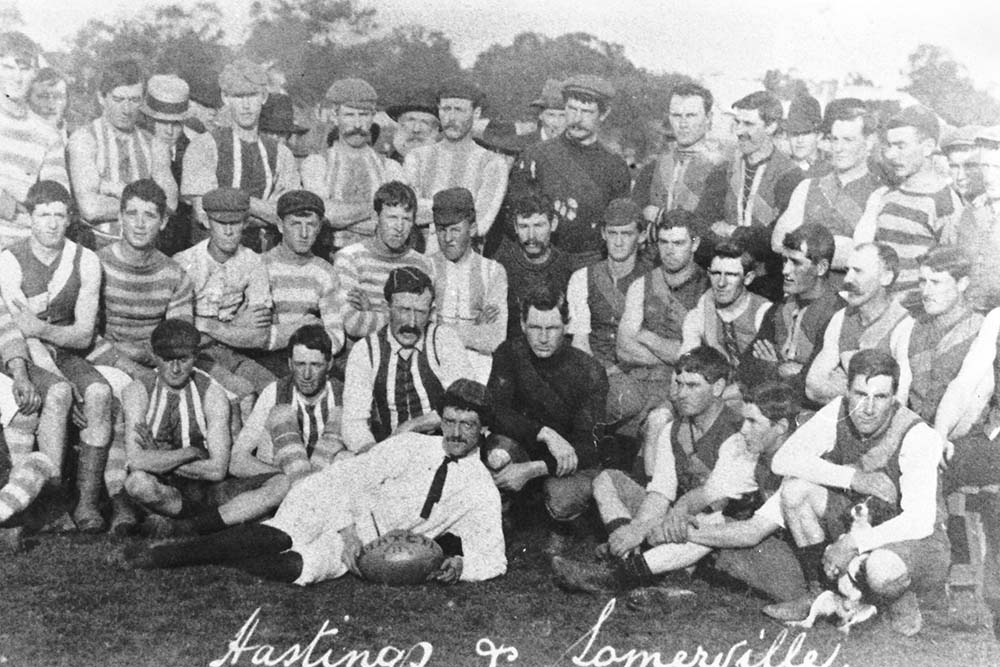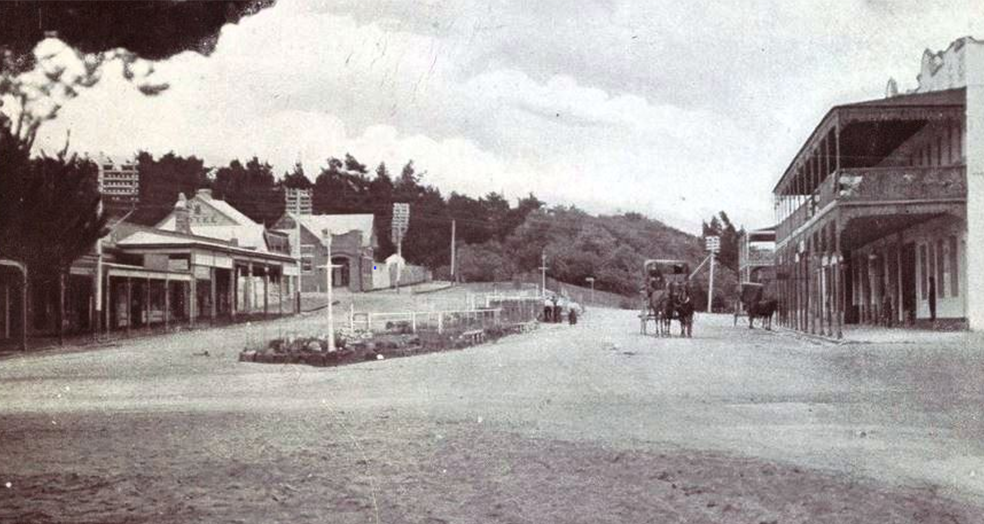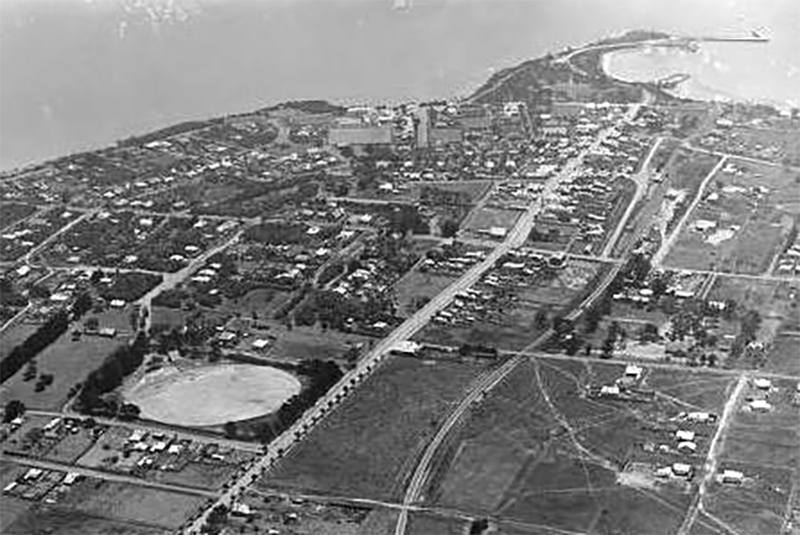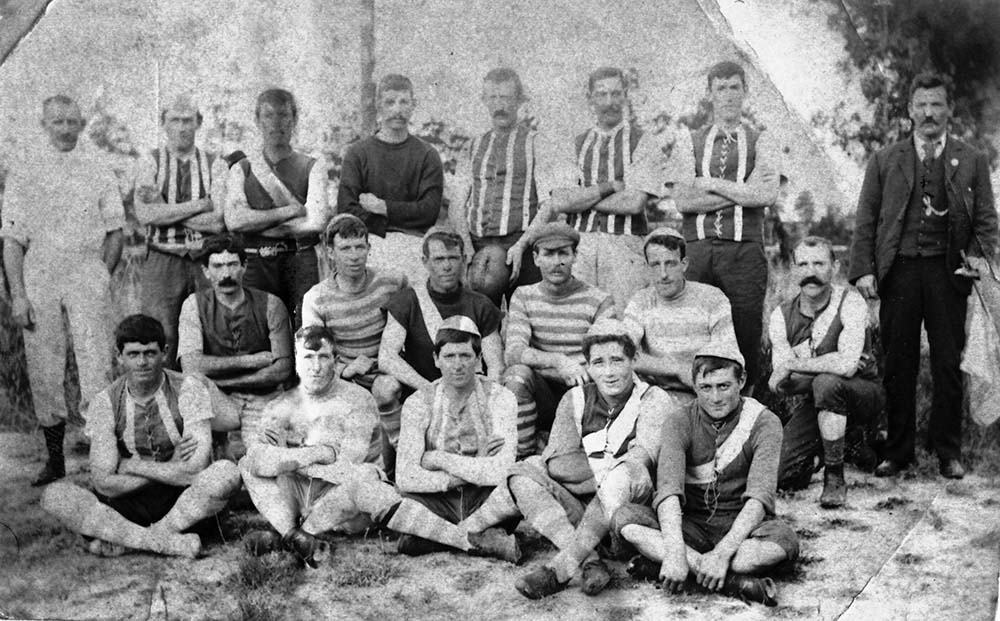By Lance Hodgins
The umpires at the 1908 Grand Final between Hastings and Frankston had an easy day. Why? Well, only the Hastings team took the field. How could this have happened?
A Football Association is formed
After a number of disputed seasons, football followers on the Mornington Peninsula were ready for a formal competition and an organised premiership. Representatives from Frankston, Somerville, Mornington, Tyabb, Dromana and Hastings formed the Peninsula Football Association.
On Thursday 25 April 1908, delegates met at the Somerville Hotel where the owner, CJ Davies, was elected president. The new Association sat late into the night deciding on the rules of the competition. They considered fixtures, player permits, appointment of umpires and several other matters which were printed on neat folding cardboard and rapidly snapped up for three pence each by the players and supporters.
There was even a trophy. Mrs E J Watson, a wealthy Frankston supporter, had come forward with an attractive offer of either a pennant or caps for the premiership players.
The competition begins
Tyabb withdrew just before the first round and several good players drifted to both Hastings and Somerville. This created a bye, however, and the opening round of the new Peninsula Football Association on 9 May featured two matches.
Frankston travelled to Somerville where the ground sported new goal posts but still had the huge slope which tested the not-so-fit when running uphill. Amongst the supporters was Mrs Watson who had come to see her team take out the win. Frankston 5-7 defeated Somerville 3-4.
Hastings journeyed to Dromana where they found the ground in good shape, but not so their hosts. Dromana struggled to field a strong side, with only seven senior players and the rest from junior ranks. The competition’s best player, Ernie Rudduck, had gone to Western Australia and their young gun, 18-year-old Doug Chapman, was playing for Richmond in the VFL. Hastings took control from the first bounce and ran out easy winners 10-22 to 2-3.
Early signs indicated that Frankston and Hastings would be the dominant teams. When they met in round three the weather was perfect for football and a large crowd of spectators gathered at Hastings Park. The home club put a heavy, well-trained eighteen into the field and jumped to an early lead which they consolidated as the game went on. Half time leaders by 24 points to 7, Hastings finished over the top of Frankston 5-14 to 3-4. Play was rough and tumble throughout and the game was full of incidents. After one such episode, a Hastings player incurred the wrath of even his own club committee, who sanctioned him and suggested he “stand down” for the remainder of the season.
The following weeks saw some spirited football. Mornington and Somerville both showed improvement but ultimately lacked the fitness and physical strength to challenge the leaders. At the half way point of the season, Hastings headed the premiership table with 5 wins from 5 games ahead of Frankston (4 wins), Somerville (3), Mornington (2) and Dromana (1).
The season continues and the arguments begin
Given their ladder positions, it was only natural that the match on 4 July between Frankston and Hastings would arouse much interest. The Hastings team arrived on the mid-day train and brought over 100 supporters with them. They had a handy lead at the main break but were held scoreless in the second half to suffer their first defeat of the year. Frankston 1-12 defeated Hastings 2-0, the low scores reflecting a close and exciting tussle as the ball passed from end to end with clever play from both sides.

The battle between Hastings and Frankston continued off the field and their delegates clashed angrily at the Association meeting on the following Wednesday. Frankston were already in a complaining mood. They had protested the legality of the Dromana player, Chapman, who had played for Richmond and then played against them – clearly against PFA rules – but the protest was dismissed as the wrong date had been stated.
Frankston then turned to the Hastings match, in which the umpire had, quite rightly, reported a case of obscene language made towards one of their players by an opponent. This protest was also dismissed because “Smith”, the perpetrator, had given a false name to the umpire.
Hastings hit back. They claimed that one of the Frankston players, Prater, had played for another club. Frankston replied that Prater had taken the field at halftime for their opponents in a practice match during their bye weekend. When that protest was dismissed, Hastings entered another one which alleged that Frankston was playing a William Pidoto, of the Fitzroy Trades team, under an assumed name. The matter was held over until the next meeting by which time a letter was received from Pidoto swearing that he had never played for Frankston – and the matter was conveniently dropped.
The second half of the season brought no change to the ladder. Hastings continued on top with nine wins from 10 games, and were the “minor premiers”. They were followed by Frankston (8/10), Somerville (5/10), then Mornington on percentage ahead of Dromana (both 4/10).

The finals begin
In the system that was widely used at the time, first would play third and second play fourth in the semi-finals. The two winners would then play off in the final. If the winner was not the team that had finished on top of the ladder (the “minor premier”), then it had the right to challenge for the premiership.
On 1 August, two exciting semi-finals were played, with both matches being won by a point.
The Somerville and Hastings game at Frankston was a splendid contest. Hastings entered as favourites despite being without a couple of their better players and facing an improving Somerville team at full strength. The play was rough and so was the supporters’ barracking, and the local constable’s notebook was kept busy.
Somerville led all day. The final term was particularly torrid as Hastings fought back strongly, and excited spectators repeatedly spilled onto the playing field. A Hastings goal just before the bell left everyone confused as to who had won. Finally it was announced: 5-6 to 5-5 for Somerville and they were into the final.
The other semi-final was between Mornington and Frankston and the livery stables struggled to provide enough vehicles for the large number of supporters wanting to go to the Somerville ground. The large crowd was not disappointed. Frankston were held scoreless in the first quarter only to fight back in the final term and win by a solitary point: 1-7 to 1-6.
The Association meeting the following Thursday was always going to be a busy one and it went until after midnight. Mornington protested that Frankston had used an illegal player. Frankston claimed an honest error in spelling the man’s name on the team sheet and the matter was held over for investigation.
Hastings also protested their loss on two grounds: an illegal Somerville player and a behind that had been disallowed by the goal umpire. As only one deposit was lodged, the Association ruled that only one protest could be heard and Hastings chose to pursue the illegal player.

Hastings claimed that WG Thornell had been living at Ryanston, in Gippsland, for almost a year. Somerville contended that Thornell had regularly come “home” to his birthplace on most weekends and holidays. After much argument, and taking into account the confused nature of the score in the game, it was suggested that the match be played again. The Hastings delegates consulted their captain and a few others waiting outside the meeting, and decided to accept this – but not under the same umpire. A date was set and the Association ruled that the central umpiring would be “shared” between that umpire, Wilson, and another.
On 15 August the Hastings-Somerville replay took place at Frankston in front of a large crowd. A calm, fine day was perfect for football and the Frankston Brass Band added to the atmosphere. By mutual agreement, the teams were the same as in the previous match, except for one Somerville player who had sprained his ankle and had to be replaced. Wilson umpired the first and third quarters and Brown the second and fourth.
Ironically it was Thornell who scored the first goal from a free kick for Somerville. When “Nipper” Floyd responded with one on the run for Hastings, the tone was set for a to-and-fro tussle. Hastings were ahead by 6 points at half time but ultimately relinquished the lead and were well beaten by Somerville 8-6 to 5-7.
The right of challenge
Hastings were now out of the finals and the question arose: did they, as the minor premiers, have the right to challenge the winner of the final? This matter dominated the business of the next Association meeting.
Rule 3 of the Association stated that all matches were to be played under VFL rules except where superseded by local rules. VFL rules gave the team which finished on top of the ladder the right of challenge in a final game for the premiership, but the Association stopped short of including the challenge. Rule 24 simply stated there would be two complete rounds of matches, after which the first four clubs would be placed in semi-finals, the winners of each semi-final to play off for the premiership.

The delegates of the Association agreed that their general understanding at the beginning of the season was that the minor premiers would have the right of challenge. Hastings had that right and 12 September was put aside as the date.
On Saturday 22 August, Frankston faced Somerville in their “final”. The Somerville club had arranged a special train to Mornington which picked up many passengers along the way. Many vehicles also left Frankston and it is estimated that over 1,000 people watched the game. Again Wilson and Brown took turns in umpiring quarters. It was generally a sportsmanlike game until the final moments when several players “lost their heads”. Frankston won the flag by 14 points: 5-9 to 3-7.
There was much jubilation at the conclusion of the game and, amidst their celebrations, rumours were rife that Frankston would not be entertaining a challenge final. They even organised a Frankston v Old Players game for the date that had been set aside by the Football Association for the challenge.
For the Hastings players, it was to be an empty 12 September. They ran onto the Mornington ground, umpire Brown bounced the ball, a behind was kicked, and the game was declared in favour of the Blues.
When the Football Association next met at Mornington’s Grand Hotel with Mr L Harrison in the chair and two delegates from each club, the Frankston delegates were noticeably absent. In their place was a letter from the Frankston club secretary stating that, as they had won the premiership legally and there was therefore no business to discuss, their delegates would not be attending.
Frankston pointed out that three days before the scheduled challenge match, their club secretary had written to the Association clearly stating that the team had no intention of playing.
In response, one delegate pointed out that the Association had frequently referred to the right of challenge throughout the year. In fact, the minutes of the 23 July Association meeting showed that they had even nominated the ground for such an occurrence, specifically “… that in the event of a challenge match the ground would be Mornington”. It was noted that no protest had been offered by the Frankston delegates at that time.
Dromana moved that Rule 21 be invoked, and demanded that Frankston be fined 10 shillings for missing a game, which was carried unanimously. In terms of the umpiring fee, Hastings had already paid Brown his 15 shillings. As umpire Wilson had also put in his account it was agreed that it be forwarded to Frankston for payment.

The Mornington delegate felt that Frankston had treated the Association with contempt. The discussion quickly escalated until Dromana moved, and Hastings seconded, that Frankston be banned for life. The debate was keen but without malice and some felt that many Frankston players and supporters had been hijacked by a small group. After a long time total agreement was reached and, on the motion of Somerville and Hastings, it was decided that Frankston be given a chance to pay the fine and the umpire’s fee.
At the next Association meeting, a letter from the absent Frankston delegates was received. They flatly refused to pay either the fine or the umpire’s fee since “the delegates had acted outside the rules in allowing the challenge match”. They also asked for the withdrawal of the Association statement that Hastings were premiers.
The Mornington delegate led a vote to disqualify Frankston “at the pleasure of the Association” and this was passed with only one vote against.
The Watson ‘trophy’
The Association secretary informed the meeting that he had written to Mrs Watson, who had promised caps for the premiers, warning her that Frankston’s absence from the challenge match would cause them to forfeit. Mrs Watson replied that she had received legal advice that Frankston were the premiers and that she was going to present the caps. She did this on 12 September – ironically, and perhaps quite pointedly, the very day set down for the challenge match.
The secretary felt that under the circumstances the Frankston players had been “dishonourable and unsportsmanlike” in accepting them. He then produced the pennant the Association had purchased: a two metres one of blue material with the lettering in white – “HFC Premiers 1908”.
The official meeting then adjourned to the hotel dining room for a presentation smoke night. In toasting “The Premiers”, the Association chairman Harrison stated that Frankston had been ill-advised and that their behaviour and attitude to the hardworking delegates, who had frequently travelled long distances, was “beyond words”. He believed that Frankston had shared an understanding of the right of challenge since the start of the season, and in the end had taken advantage of a doubt in the rules.
On 10 October, the 1908 premiership pennant finally came home to Hastings at a social evening held in the hall. Delegate TR Pearce said that the players and officials of Hastings had played by the rules at all times but, on several occasions, had met with contemptible treatment. Councillor JD Hodgins stated that Hastings had played honourably and won a moral victory.
The captain of the Hastings team, Thomas Knox, was to have the last word. He stated that all Hastings wanted was the premiership for which they had fought so hard. As far as he was concerned, Frankston could keep their caps.

Postscript
Expelled by the Peninsula Football Association, Frankston fielded a team in the Federal League in 1909 but was allowed to return in the following year. Meanwhile, Hastings were premiers again in 1909 and then, for good measure, they defeated Frankston in the Grand Final in 1910, completing what these days is referred to as a ‘three-peat’.






